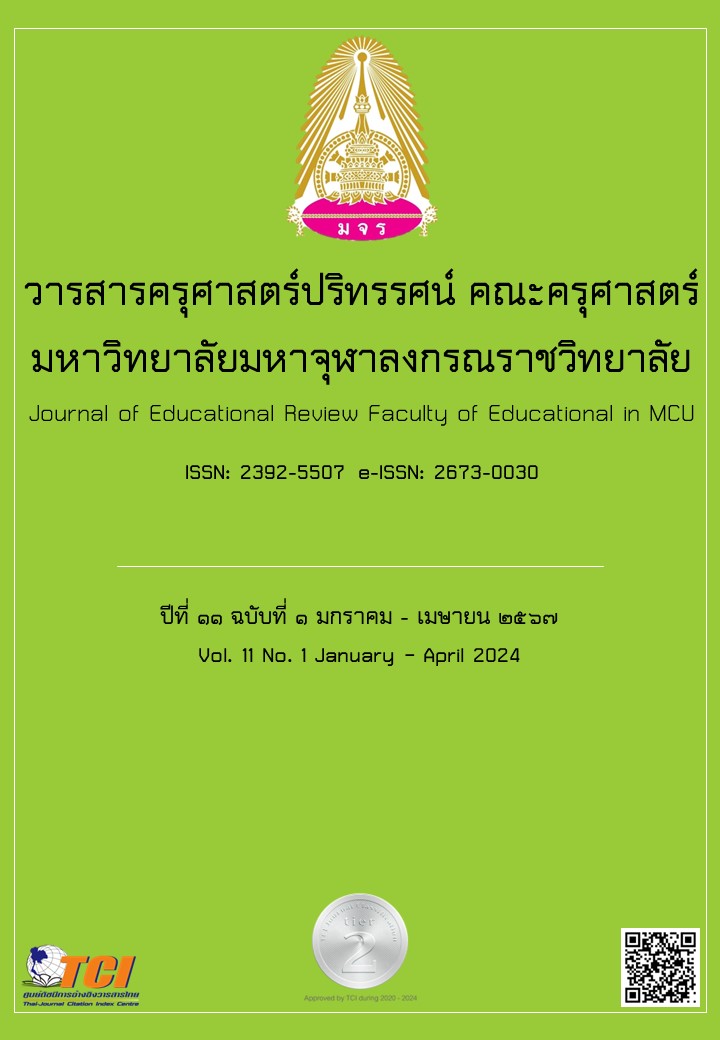THE ENGLISH-SPEAKING SKILLS DEVELOPMENT FOR COMMUNICATION USING TIKTOK APPLICATION IN LEARNING MANAGEMENT FOR GRADE 6TH STUDENTS IN SCHOOL UNDER THE OFFICE OF THE PRIVATE EDUCATION COMMISSION, RAT BURANA DISTRICT, BANGKOK
Main Article Content
Abstract
The objectives of this research were to 1) compare the English-speaking skills for communication before and after learning management using the TikTok application. 2) compare the English-speaking skills for communication after the learning management using the TikTok application with the determined criterion of 70 percent and 3) study the satisfaction of students on the learning management using the TikTok application. A sample of 40 students in grade 6 at YaowaluckWittayaThonburi School, during the second semester of the academic year 2020, were obtained by cluster random sampling. The research instruments consisted of 1) a learning management plan to develop English speaking skills 2) an evaluation form on English speaking skills for communication and 3) a satisfaction questionnaire on learning management. Using statistics for data analysis were mean, standard deviation, and t-test. The results of the research revealed that 1) the post-test scores of English speaking for communication skills of students after learning management using the TikTok application were statistically higher than before at 0.05 level of significance, 2) the post-test scores of English speaking for communication skills of students after learning management using the TikTok application were statistically higher than the determined criterion of 70 percent at 0.05 level of significance. The students’ satisfaction with learning management using the TikTok application in overall was a high level.
Article Details

This work is licensed under a Creative Commons Attribution-NonCommercial-NoDerivatives 4.0 International License.
ทัศนะและความคิดเห็นที่ปรากฏในบทความในวารสารฉบับนี้ถือเป็นความรับผิดชอบของผู้เขียนบทความนั้นเพียงผู้เดียว และไม่ถือเป็นทัศนะและความรับผิดชอบของกองบรรณาธิการ
กองบรรณาธิการขอสงวนสิทธิ์ในการคัดเลือกบทความลงตีพิมพ์และจะแจ้งให้เจ้าของบทความทราบหลังจากผู้ประเมินบทความตรวจอ่านบทความแล้ว
ต้นฉบับที่ได้รับการตีพิมพ์ในวารสารครุศาสตร์ปริทรรศน์ คณะครุศาสตร์ มหาวิทยาลัยมหาจุฬาลงกรณราชวิทยาลัย ถือเป็นกรรมสิทธิ์ของคณะครุศาสตร์ มหาวิทยาลัยมหาจุฬาลงกรณราชวิทยาลัย ห้ามนำข้อความทั้งหมดหรือบางส่วนไปพิมพ์ซ้ำ เว้นเสียแต่ว่าจะได้รับอนุญาตจากมหาวิทยาลัยฯ เป็นลายลักษณ์อักษร
References
จิราพร เณรธรณี. (2565). ประยุกต์ใช้ TikTok ในห้องเรียนอย่างไรให้น่าสนใจและเกิดประโยชน์. แหล่งที่มา https://www.educathai.com/knowledge/articles/618 สืบค้นเมื่อ 7 พ.ค. 2565.
ทิศนา แขมมณี. (2560). ศาสตร์การสอน: องค์ความเพื่อการจัดกระบวนการเรียนรู้ที่มีประสิทธิภาพ. พิมพ์ครั้งที่ 21. กรุงเทพมหานคร: สำนักพิมพ์แห่งจุฬาลงกรณ์มหาวิทยาลัย.
ปวีณนุช พุ่มจิต และอังค์วรา เหลืองนภา. (2562). การใช้แอปพลิเคชันในการพัฒนาทักษะภาษาอังกฤษด้านการฟัง. รายงานสืบเนื่องการประชุมวิชาการนำเสนอผลงานวิจัยระดับชาติของนักศึกษาด้านมนุษยศาสตร์และสังคมศาสตร์ ครั้งที่ 2. กรุงเทพมหานคร: คณะมนุษยศาสตร์และสังคมศาสตร์ มหาวิทยาลัยราชภัฏสวนสุนันทา.
รมณียา สุรธรรมจรรยา. (2558). ผลการใช้แอพพลิเคชั่นสำหรับสอนคำศัพท์ภาษาอังกฤษบนแท็บเล็ตวิชาภาษาอังกฤษสำหรับนักเรียนชั้นประถมศึกษาปีที่ 2 สังกัดสำนักงานเขตพื้นที่การศึกษาประถมศึกษาราชบุรี เขต 2. วิทยานิพนธ์ครุศาสตรมหาบัณฑิต. มหาวิทยาลัยศิลปากร.
วิจารณ์ พานิช. (2555). วิถีสร้างการเรียนรู้เพื่อศิษย์ในศตวรรษที่ 21. กรุงเทพมหานคร: มูลนิธิสดศรี-สฤษดิ์วงศ์.
สถาบันส่งเสริมการสอนวิทยาศาสตร์และเทคโนโลยี. (2564). ศธ.หนุน สสวท. จับมือ TikTok กระตุ้นการเรียนรู้เด็กไทยยุคใหม่-ครูไทยยุคดิจิทัล. แหล่งที่มา https://www.ipst.ac.th/news/7797/tiktok01.html สืบค้นเมื่อ 15 ม.ค. 2564.
สหรัฐ ลักษณะสุต. (2563). ผลการจัดกิจกรรมการเรียนรู้แบบร่วมมือเทคนิคเกมกลุ่มแข่งขันเพื่อพัฒนาผลสัมฤทธิ์ทางการเรียนภาษาอังกฤษของผู้เรียนชั้นมัธยมศึกษาปีที่ 3 โรงเรียนสาธิตมหาวิทยาลัยราชภัฏสวนสุนันทา. วารสารนวัตกรรมการศึกษาและการวิจัย. 4(3). 247-262.
สำนักงานเลขาธิการสภาการศึกษา. (2560). แผนการศึกษาแห่งชาติ พ.ศ. 2560 – 2579. กรุงเทพมหานคร: พริกหวานกราฟฟิค.


